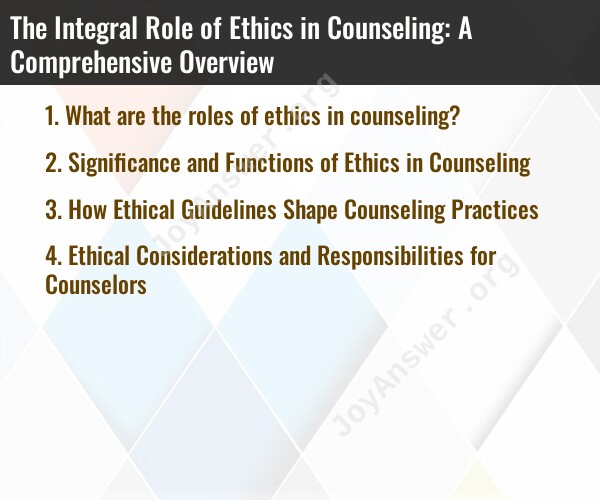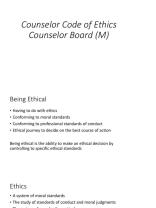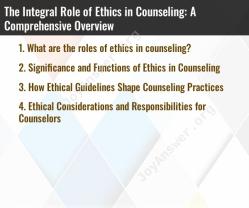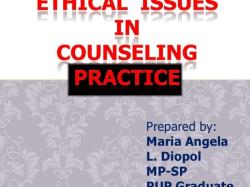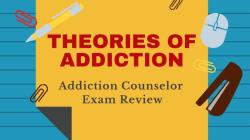What are the roles of ethics in counseling?
Ethics plays a fundamental and integral role in counseling, guiding the behavior of counselors and shaping the therapeutic relationship with clients. The roles of ethics in counseling are comprehensive and encompass various aspects of professional practice. Here is an overview of the key roles of ethics in counseling:
Client Well-Being:
- The primary role of ethics in counseling is to prioritize the well-being and welfare of clients. Ethical guidelines and principles guide counselors in making decisions that are in the best interests of their clients, ensuring their safety, emotional well-being, and overall growth.
Establishing Trust:
- Ethics is crucial for building and maintaining trust between counselors and clients. Clients share personal and sensitive information during counseling sessions, and ethical behavior, including confidentiality and integrity, is essential for creating a safe and trusting therapeutic environment.
Confidentiality:
- Maintaining confidentiality is a cornerstone of ethical counseling practice. Clients need assurance that their private information will be protected, fostering an environment where they feel comfortable discussing personal and sensitive issues.
Informed Consent:
- Ethical principles emphasize the importance of obtaining informed consent from clients before initiating counseling services. This involves providing clients with information about the nature of counseling, the counselor's approach, potential risks and benefits, and the limits of confidentiality.
Competence and Professionalism:
- Ethics ensures that counselors strive for and maintain a high level of competence in their practice. This includes ongoing professional development, staying informed about best practices, and recognizing the limits of one's expertise. Professionalism, honesty, and transparency contribute to ethical conduct.
Cultural Competence and Diversity:
- Ethical guidelines promote cultural competence and sensitivity to diversity. Counselors are expected to be aware of their own biases, respect the diverse backgrounds of clients, and adapt their approach to be inclusive and affirming.
Avoiding Harm:
- Ethical considerations require counselors to avoid causing harm to clients. This involves careful consideration of counseling methods, potential risks, and ensuring that interventions are designed to benefit clients without causing undue harm.
Respecting Autonomy:
- Ethical counseling respects the autonomy of clients. Clients have the right to make their own decisions, and counselors should support informed decision-making, even when they may not fully agree with the client's choices.
Professional Boundaries:
- Ethical guidelines define and maintain appropriate professional boundaries in the counselor-client relationship. Clear boundaries help ensure the objectivity, professionalism, and ethical integrity of the counseling process.
Supervision and Consultation:
- Ethical counseling practice includes seeking supervision and consultation when needed. Supervision provides a space for counselors to reflect on their work, receive guidance, and address ethical dilemmas with experienced professionals.
Advocacy and Social Justice:
- Ethics in counseling extends to advocacy for clients and social justice. Counselors are encouraged to identify and address systemic issues that contribute to clients' challenges and to advocate for policies that promote equity and fairness.
Legal Compliance:
- Counselors are expected to be aware of and comply with the laws and regulations governing the practice of counseling in their jurisdiction. Ethical practice aligns with legal requirements to ensure the protection of clients and the public.
Continuous Improvement:
- Ethical principles encourage counselors to engage in continuous self-reflection, professional development, and ongoing education. This commitment to improvement ensures that counselors stay informed about evolving ethical standards and best practices.
In summary, the roles of ethics in counseling are multifaceted and central to the profession. Ethical practice is not only a set of rules but a guiding framework that ensures the integrity, effectiveness, and ethical responsibility of counselors in their work with clients. It contributes to the development of a therapeutic relationship built on trust, respect, and a commitment to the well-being of clients.
Significance and Functions of Ethics in Counseling
Ethics in counseling play a crucial role in safeguarding clients and ensuring the integrity of the profession. Here's why they are so significant:
1. Protecting Clients:
- Ethical guidelines establish boundaries and limitations on professional conduct, minimizing risk and preventing harm to clients. This protects against exploitation, ensures confidentiality, and upholds client autonomy.
- They guide responsible decision-making and ensure informed consent, empowering clients to make informed choices about their counseling journey.
2. Building Trust and Rapport:
- Adherence to ethical principles fosters trust and respect between counselors and clients. This creates a safe and supportive environment where clients feel comfortable to be vulnerable and open up about their challenges.
- Ethical practice builds client confidence in the profession and encourages individuals to seek help.
3. Maintaining Professional Standards and Accountability:
- Ethical guidelines hold counselors accountable for their actions and uphold the integrity of the profession. They create clear expectations for professional conduct and provide mechanisms for addressing ethical breaches.
- This safeguards against misuse of power and ensures counselors conduct themselves with honesty, fairness, and respect for others.
4. Promoting Social Justice and Advocacy:
- Many ethical codes explicitly call upon counselors to champion social justice and advocate for vulnerable populations. This includes addressing systemic inequalities, challenging discrimination, and promoting equal access to mental health services.
- Ethical practice empowers counselors to be agents of positive change and contribute to a more just and equitable society.
How Ethical Guidelines Shape Counseling Practices
Ethical guidelines shape counseling practices in numerous ways:
- Guiding Clinical Decision-Making: When faced with complex situations or ethical dilemmas, counselors can rely on ethical principles to guide their decisions. This helps ensure responsible and client-centered choices.
- Establishing Professional Boundaries: Ethical guidelines define appropriate boundaries between counselors and clients, minimizing the risk of exploitation or harm. This includes avoiding dual relationships, maintaining confidentiality, and avoiding inappropriate physical contact.
- Promoting Cultural Competence: Ethical codes emphasize cultural competence, urging counselors to recognize and respect diversity, avoid personal biases, and adapt their approach based on clients' cultural backgrounds and values.
- Encouraging Ongoing Professional Development: Ethical practice requires counselors to engage in continuous learning and update their knowledge and skills. This ensures they provide effective and evidence-based services to their clients.
Ethical Considerations and Responsibilities for Counselors
Counselors carry several key ethical considerations and responsibilities:
- Prioritizing Client Well-being: The well-being of clients should always be paramount. This means putting client needs above personal interests and making decisions that serve their best interests.
- Maintaining Confidentiality: Client information, including discussions, notes, and records, must be kept confidential with limited exceptions (e.g., imminent danger). Counselors should be transparent about limitations to confidentiality and obtain informed consent before any disclosures.
- Avoiding Conflicts of Interest: Counselors should identify and avoid potential conflicts of interest that could compromise their professional judgment or exploit clients. This includes financial incentives, dual relationships, or personal biases.
- Engaging in Ethical Consultation: When faced with complex ethical dilemmas, counselors should seek consultation from supervisors, colleagues, or ethics experts. This helps ensure thoughtful and informed decision-making.
- Reporting Unethical Behavior: Counselors have a responsibility to report suspected ethical violations by colleagues to protect clients and uphold the integrity of the profession.
Ethical practice is not merely following a set of rules; it's about developing a deep understanding of ethical principles and applying them in diverse situations. Counselors should continuously reflect on their own practice, stay informed about new ethical challenges, and actively engage in ongoing professional development to uphold the highest standards of ethical conduct.
I hope this comprehensive overview provides a clear understanding of the significance, functions, and practical applications of ethics in counseling. Feel free to ask any further questions you may have about specific ethical considerations or situations you'd like to explore further.
